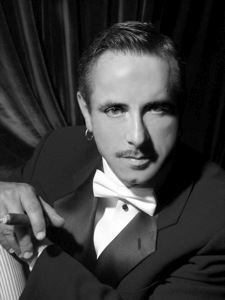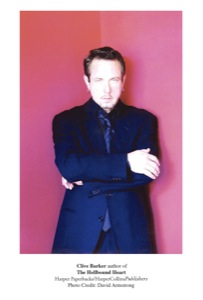Arts & Entertainment
Clive Barker exorcises his demons
Published Thursday, 15-Nov-2007 in issue 1038
Openly gay author Clive Barker has been able to utilize his vivid imagination ever since he became a literary fixture in the 1980s, with a blend of horror and fantastic elements in his novels.
Beginning with The Books of Blood volumes 1-6, it was evident that there was a new kid on the supernatural block, particularly when horror-meister Stephen King proclaimed, “I have seen the future of horror and its name is Clive Barker.”
Barker’s bright future included both writing and directing films based on his works Hellraiser, Candyman, Nightbreed, and Lord of Illusions. With more than 14 books under his belt (including Weave World, Imajica, Galilee and The Great and Secret Show), Barker’s branched out in recent years with a series of books, the Abarat series which he also illustrated, geared toward a younger demographic.
While Barker might seem an unlikely candidate to pen books aimed at young adults, it should really come as no surprise to anyone who read his tremendous fantasy tale, The Thief of Always circa 1992, which appealed to a younger fan base.
Barker’s brand of dark fantasy has always been able to elicit nightmares on a cerebral level, and his latest novel, Mister B. Gone, is no exception.
This is Barker’s much-anticipated return to adult literature with a tale that encompasses the timeless battle of good versus evil. His last adult novel was 2001’s Coldheart Canyon: A Hollywood Ghost Story.
In Mister B. Gone, a centuries-old autobiography written by a demon, Jakabok Botch, holds secrets that could unravel the fabric of civilization.
Mister B. Gone has its roots in a reality that very much frightens Barker.
“What I do believe, and what is reflected in the book, is that this easy division into evil and good, which our president finds so very easy, and such an easy justification for pretty odious maneuverings,” said the gracious Englishman, who resides in Beverly Hills with his partner of 17 years, David Armstrong. “There’s definitely a sense I am trying to get across in the book that these simple divisions just don’t work.
“They are just essentially two sides of the same dirty, grubby little coin – and isn’t that why wars are fought? Isn’t it always about that, finally? Is it always about a closed room, and a bunch of people, whose faces we don’t know, and whose names we don’t know, carving out the world behind our backs? There’s a lot of anger in that book, and it comes from watching Cheney and it comes from watching Bush. I also think we need to find ways to tell stories that get the dialogue going about anger, and about how we are being fucked around with constantly behind our backs.”
Politics aside, writing Mister B. Gone for Barker was akin to a homecoming in a literary sense.
“It’s like a return, not to the kind of horror that I’d written in The Books of Blood, which was very visceral, very gory,” he said. “Mister B. Gone is scarier in a different way, but it felt like a return in one very particular sense, which is going back to the discipline of a much shorter form of fiction.
“I also loved the idea of writing in the first person, the demon, that seemed like so much fun, and I could hear the voice very clearly in my head. So, yes it was a homecoming in many ways, but in a lot of other ways it had its own particular challenges.”
In most of Barker’s novels, supernaturalism and sexuality collide, feeding on each other, symbiotic night creatures that are intrinsically linked.
“I just think everything that is primal in our nature is the stuff of my fiction,” he said. “I’ve never been interested in pussyfooting around. So much horror and fantasy is sublimated sex, I mean the vampire, it’s not even subtle; it is very obvious what’s going on there. The werewolf with all these images of transformations overtaking bodies and people becoming other than themselves in the grips of feelings they can’t entirely control – that’s sex, right?”
Barker believes these elements are key in his writing, where he can exorcise his own demons.
“I’ve always tried to be honest about my feelings in my fiction. Yes, I’m writing fantasy; yes, I’m using imaginative worlds and characters to embody my feelings, and dramatize my feelings,” he says. “But, what you get in the books is Clive – it’s what I believe.”
One of the novels where this philosophy came into play was 1996’s, Sacrament, an allegorical tale of a gay male photographer chronicling wildlife species nearing extinction, while dealing with AIDS decimating his tight-knit circle of friends in San Francisco.
“What I wanted to do with Sacrament was write what it was like for a gay man in the real world. What it is like going out on Folsom Street looking for sex one night – how does that actually feel with adding the supernatural stuff to it,” he said, before shifting into his contemporaries’ takes on the matter.
“I think where people are writing in this area have a caution is, if you dramatize the hidden message of the material, you essentially remove its power. That’s always been the fear that people have had that, ‘Oh shit, if I put sex into this book, then what’s the hidden taboo?’ And, the taboo has always been, I believe, in horror, sex,” Barker said. “Which is why, particularly, of course, sex of a ‘perverse’ kind (is taboo), and I have always thought that was the reason they were doing it (excluding gay characterizations and sex). My theory was, ‘Well, I’m going to put the sex in and still be scary.’ I wanted to wipe all that away, and say, ‘Get over yourselves, let’s start again and put everything you know about human nature on the table, including sex – why not?’”
Barker’s notoriety as a horror visionary was all but cemented with the 1987 film, Hellraiser, and now 20 years later, it has been announced that a remake is being launched. Unlike, some recent horror movie remakes, Barker will have some involvement in the re-launching of the original project that essentially made him a household name, and he holds a tad bit of excitement and trepidation about bringing something new to the table, while maintaining some semblance of his original film .
“Well, they’re still in the process of working out how my relationship will work with this project,” he says. “There are two Frenchmen who are presently attached to do the actual writing and directing of the project. And I will produce and have some hand in the story. But, I feel as though, 20 years on, there’s a whole new generation of make-up and prosthetics and CGI – and I say that reluctantly, because I am not a fan of CGI. But, I think it could do amazing things for, say, the opening of the box. I mean I think that would be something that CGI could do miraculously well.
“We’ll see how it all goes. I’ve been around movies a long time now, and one thing I know is you are wasting your time if you try to predict with any degree of accuracy how things are going to go down.”
Something that Barker can always bank on is his multi-talented Renaissance-man approach to his creativity. Aside from his literary skills and involvement in the world of filmmaking, Barker is also proving himself to be a man of many talents with his other artistic endeavor, painting.
“In a way, painting is taking color out for a fucking romp. I love to be surrounded by color; there is something so sexy and powerful and appetizing about it,” Barker proclaimed. “The speed of our pulse increases when we look at the color red, blue soothes us – there’s emotional responses we are having to all of these things. So when I get into my room of colors, my studio, all of the intellectual stuff goes out of the window and instinct takes over.”
With all of these facets of his phenomenal imagination at the ready, Barker explained which areas of his artistry bring him the most joy and which ones he would be more than happy to not partake in again.
“Every day I paint and I write, and I can’t imagine anything more satisfying than that combination,” he said. “If I never involved myself in another movie, it would not break my heart.”
For Barker, even though he is dealing with amazing worlds that live solely inside of his mind until he gets them out as a written gospel, the creative process unfolds from a very real place, and utilizes a different side of his brain than his artwork.
“I’m a very analytical writer, and I might try to erase as much of the signs of analysis in the final polish; so that it seems to be naked emotion, but it’s naked emotion within a structure I have very meticulously created first. Otherwise, it would just fall apart.
“When you’re dealing with the fantastic, structure is very important. You’ve got to have the time to build the characters and to tell the back story, and to give people an understanding of what the issues are.”
|
|
Copyright © 2003-2025 Uptown Publications



